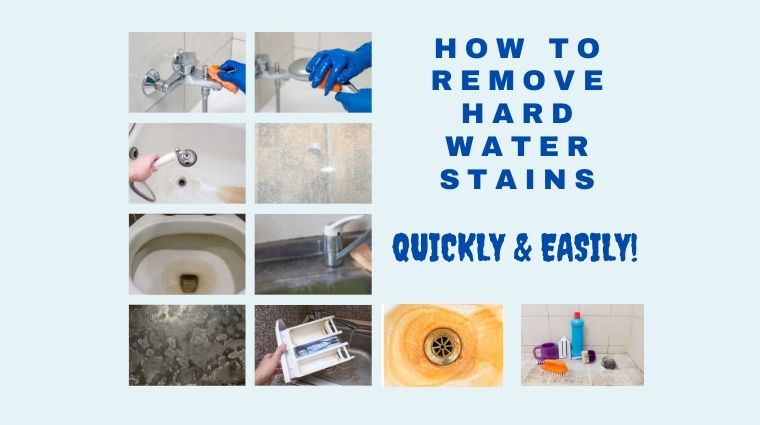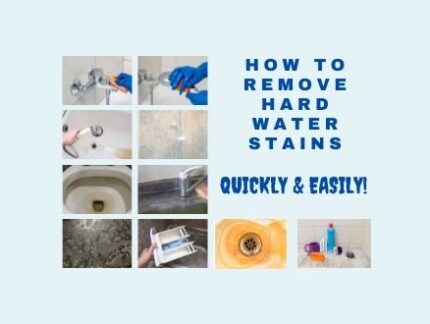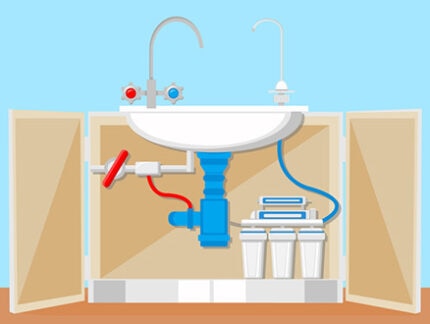If one of your major sources of water is a tap or a well, the chances are that you’ve probably had to deal with hard water sings at some point in your life. It often makes your soap lather a little less. As a result, your dishes aren’t as clean and, worst of all, you have to use twice the amount of soap you usually would.
Unfortunately, this isn’t the only problem that hard water presents. It also leaves stains on your dishes, plastics, and taps, among other places. This can make the simple act of cleaning a rather tedious process. However, luckily, you can quickly resolve this problem.

In this article, we’ll walk you through how to remove hard water stains quickly and effectively. That way, you don’t need to spend an entire day scrubbing away and hoping for the best.
- What causes hard water stains/spots?
- Why does vinegar work remarkably on hard water stains?
- Tools required to remove different hard water stains
- How to remove hard water stains from faucet
- How to remove hard water buildup from showerhead
- How to remove hard water stains from bathtub
- How to remove hard water stains on shower glass & walls
- How to get rid of hard water stains from toilet bowl
- How to remove hard water stains from sink
- How to get rid of hard water stains on dishes
- How to clean hard water stains on granite & marble
- How to get rid of hard water stains on plastic
- 5 Best hard water stains removers of 2022
What causes hard water stains/spots?
Before going into detail about how to get rid of hard water stains, it is essential that we first talk about what causes them in the first place. Luckily, the answer is pretty simple – hard water.
Unlike its regular, softer counterpart, hard water contains a much higher amount of calcium and magnesium than usual. As a result, when it is constantly spilling on your dishes or passing through your faucet/shower head, it leaves traces of those minerals.
These traces are often too tiny to be seen under normal circumstances. But, when your water is consistently hard, and you’re always using it with the same faucet/shower head on the same dishes, there’ll be a buildup of these minerals. When that happens, it appears as a stain, reducing the aesthetics of the affected surfaces.
Why does vinegar work remarkably on hard water stains?
If you’ve spent some time trying to find out how to remove hard water stains, you’ve probably been told that vinegar works pretty well. Whoever told you that is not wrong. Vinegar is an excellent cleaning agent, especially for hard water stains because of its acetic acid.
This component makes it a solvent of sorts that can remove the buildup of minerals on affected surfaces. Vinegar is widely used because it is incredibly cheap and effective when compared to other methods.
However, it is worthy of note that vinegar is an utterly impermanent solution. To permanently get rid of your hard water problems, you need to use a water softener. It would be useful if you’re part of the 15% of the US that depends on well water.
In-general, tools required to remove different hard water stains
- Spray bottle
- Non-scratch sponge
- Microfiber cleaning towel/Cloth
- Plastic gloves
- Multi-purpose cleaning brush set (Optional)
- Cleaning toothbrush (You may also use an old one)
How to remove hard water stains from faucet
Here’s how to clean hard water stains on your faucet:
Light Stains:
- Mix an equal amount of natural white vinegar and water and pour it into a spray bottle.
- Spray your thoroughly onto the affected surfaces, ensuring that you miss no spots.
- Scrub down your faucet with a brush, rag, or sponge. This would help get out light stains.
- Use a microfiber cleaning towel to dry the surface of your faucet.
Alternately, you could take out the faucet aerators completely and soak them in vinegar.
Hard Stains
- Pour a significant amount of the earlier created vinegar solution on your faucet. Let it soak for no less than five minutes before you wipe it off. If you have areas with thicker deposits than others, use a scrub brush to loosen them up.
- Alternately, you could use an abrasive to clean. Just make sure that you use a bathroom cleaner specifically designed for hard water stains. Additionally, ensure that you keep the room properly ventilated when you spray the cleaning agent.
- Once done, rinse the surface and dry it.
How to remove hard water buildup from showerhead
Here’s how to remove hard water stains from your shower:
Without Removing the Showerhead:
- Pick up a large, durable bag and put it around your showerhead.
- While holding it in place, fill it with vinegar.
- Fasten the bag around the showerhead with tape or a rubber band and ensure the head is totally enveloped in vinegar.
- Let it soak for no less than 12 hours. However, if your showerhead is made of brass, nickel, or gold-coated material, you don’t need more than 30 minutes for this step.
- Once done, remove the bag and empty it of its vinegar.
- Run hot water through the showerhead to take out loose mineral deposits.
By Removing the Showerhead:
- With an adjustable crescent wrench, gently unfasten the showerhead. This shouldn’t require too much effort. But, if it does, simply put an old toothbrush in vinegar and use it to scrub the shower arm. This will help dissolve whatever mineral deposits making the head hard to remove.
- Afterward, submerge the showerhead into a bowl of vinegar solution comprising hot water and white/apple cider vinegar.
- Soak about twelve hours, except the showerhead, is made of brass, nickel, or gold-coated material.
- Remove after the stipulated time and allow the showerhead to drip dry.
- Screw the showerhead back on afterward.
If, after doing all these, the stains still do not come out, you might have to use more robust solutions. CLR PRO CL4PROEA is our top suggestion in that regard. It is excellent for removing the calcium, lime, and even rust.
How to remove hard water stains from bathtub
Here’s how to remove hard water stains from your tub:
- First, boil enough water to fill up a bucket. Then, empty that bucket all over your bathtub.
- Once you’re sure every area is wet, sprinkle some baking soda on every part of the tub’s surface. If the tub is filthy, you can opt for tub-and-tile cleaners.
- Boil some more water to fill your bucket with. Half a gallon is enough as you’ll need to mix it with two tablespoons of dish soap.
- Using a stiff nylon brush or a scrub sponge and soapy hot water, scrub every part of the bathtub’s surface.
- In the process, use your bucket to occasionally rinse the brush or sponge and add soapy water to the bathtub.
- If you’re cleaning out a really filthy bathtub, sprinkle the baking soda on the brush or sponge directly. This should be done after you’ve dipped it into the soapy water in the bucket. Then, scrub the bathtub hard.
- When you’re satisfied, rinse the bathtub using the bucket or a hand sprayer.
- Finally, polish the entire bathtub with a clean and dry cloth.
How to remove hard water stains on shower glass & walls
Here’s how to clean your shower glass and walls:
- The first step is to wet the shower glass with a shower sprayer. Alternately, you can splash the walls with a bucket of water.
- Then, fill up a spray bottle with white vinegar. You’ll use this to saturate the glass thoroughly.
- Once you’ve sprayed the glass with the vinegar solution, you need to allow it to soak for no less than ten minutes. If your shower glass is very dirty, you should consider letting it soak even longer than ten minutes.
- Submerge your sponge in baking soda and use it to scrub your shower glass. The baking soda would essentially be an abrasive, and the vinegar will dissolve the minerals from the hard water.
- Immediately you’re satisfied, use fresh water to rinse off the glass.
- Dry your glass with a microfiber cloth.
- Finally, use a glass cleaner to clean the glass, towel hangers, and trim.
How to get rid of hard water stains from toilet bowl
Ingredients:
- Baking soda
- Vinegar
- Toiler brush
- Two Cups
- Hand gloves
Here’s how to remove hard water spots from your toilet bowl using baking soda and vinegar:
- Empty a cup of vinegar into your toilet bowl. Then, using a toilet brush, swish it around and allow it to sit for a minute or so.
- Add one cup of baking soda to the toilet bowl. Afterward, add about two more cups of vinegar to create a fizzing action of sorts. Once done, allow the solution to sit for about ten minutes. If your toilet bowl is particularly dirty, you could consider letting the solution remain there for more than ten minutes.
- Using your toilet brush, swish the solution inside the bowl. Ensure that in the process, you properly spread the solution to every stain above the waterline. Do not flush yet.
- After swishing it around, allow the soda and vinegar mixture to sit for another thirty minutes. Then, swish it around about two more times until the stain leaves ultimately. However, if any stains remain, you can scrub them off using a toilet brush.
- Once you’re satisfied, you can rinse your toilet bowl by flushing it.
How to remove hard water stains from sink
Ingredients
- Baking soda
- Lemon juice or white distilled vinegar
Here’s how to remove hard water deposits from your sink:
- First, clean and rinse the sink properly. Ensure that you clean the outer side and the handles as well in the process.
- Put some white distilled vinegar into a spray bottle. Afterward, spray it across the sink, making sure to cover every part. Once done, wait about five minutes for the vinegar to settle in and dissolve the stubborn stains.
- Sprinkle a measure of baking soda across the sink.
- Scrub the sink with a sponge to remove the water sponge.
- Repeat this process until you’re satisfied.
How to get rid of hard water stains on dishes
Ingredients:
- 2 cups of baking soda
- Three tablespoons of hydrogen peroxide
- One tablespoon of dishwasher detergent
- 2 cups of vinegar
How to clean your dishes:
- Mix the ingredients above until they become a paste-like material.
- Create large balls using a spoon.
- Place these balls at the dishwasher’s bottom for an entire night.
- Place a dishwasher-safe cup filled with vinegar at the top rack of your dishwasher.
- Using the hottest water available, run a wash cycle with the dishes in the dishwasher.
How to clean hard water stains on granite & marble
- Spray the affected area with a surface spray. You should do so directly with one trigger pull per 2 x 2 surface area.
- Let the liquid remain on the surface for a few minutes.
- Use an old toothbrush or a sponge to scrub the surface.
How to get rid of hard water stains on plastic
- Create a solution using water and bleach. For every cup of water, you should add one tablespoon of bleach.
- Soak the plastic in the solution for an hour or two.
- Wash the containers after the stains dissolve.
- Rinse and dry.
5 Best hard water stains removers of 2022 Recommended by Us
Better Life Natural
This is a plant-based cleaner for your tub and tiles. It easily dissolves hard water stains, soap scum, mildew stains, rust, and mineral deposits. It doesn’t use any synthetic fragrances, but it still leaves a fresh, clean smell when you’re done using it. In addition, it doesn’t use any harsh chemicals like sodium lauryl sulfates, petroleum solvent, parabens, etc.
Bring It On Cleaner
This 32-ounce hard water stain remover comprises highly effective oxygen bleach. This makes it very safe and free from toxicity in comparison with its chlorine-based counterparts. It is perfect for cleaning your shower doors, bathtubs, sinks, etc. it also leaves a fresh mint scent behind once you’re done using it.
Bio Clean
With Bio-Clean, you can take out hard water stains on various surfaces without having to spend so much time scrubbing. These surfaces include, among others, shower doors, glass, granite, etc. It is very effective for removing heavy stains on your surfaces.
CLR PRO
The CLR in CLR Pro stands for Calcium, Lime, and Rust. These three things are the primary causes of stains on surfaces. The CLR Pro stain remover is capable of taking them out with minimal effort from you. It works on virtually all types of plumbing, including copper and plastic.
Invisible Shield Limescale and Stain Remover
This 25-ounce bottle contains a liquid scale remover that can easily and effectively remove calcium, hard water minerals, grease, soap scum, etc. It works excellently for glass, ceramic, acrylic walls, etc.
Warning
- It wouldn’t be great on natural stone.
7 Pro-tips to prevent hard water stains & stay spot free
- Dry your surfaces immediately after you’ve finished using a faucet.
- Wipe down the most vulnerable areas with a natural cleaner to make cleaning easier later on.
- Clean frequently so that you don’t have massive buildups too hard to handle.
- Keep a toilet brush in every toilet and use it to clean your toilet bowl every couple of days.
- Spray your vulnerable surfaces every day.
- Seal your vulnerable surfaces.
- Use a home water softener. This will permanently resolve your problem and even remove any health risks of consuming hard water.
Conclusion
Hard water stains can be pretty frustrating because they complicate what should be a simple cleaning day. However, they’re not impossible to deal with. In this article, we’ve shown you how to get rid of them across multiple surfaces. At this point, all that’s left is to put in a little work and watch your kitchen/bathroom sparkle!
References:
- United States Geological Survey. Hardness of Water. Accessed June 12, 2021, at https://www.usgs.gov/special-topic/water-science-school/science/hardness-water?qt-science_center_objects=0#qt-science_center_objects.
- By: Leslie A. DeSimone, Pixie A. Hamilton, and Robert J. Gilliom. Quality of Water from Domestic Wells in Principal Aquifers of the United States, 1991-2004: Overview of Major Findings. Accessed June 12, 2021, at https://pubs.er.usgs.gov/publication/cir1332.
- Solutions & Concentration. Accessed June 12, 2021 at https://www2.chem.wisc.edu/deptfiles/genchem/netorial/rottosen/tutorial/modules/stoichiometry/module5_5/5_5_2a.htm.
- Pallav Sengupta. Potential Health Impacts of Hard Water. Accessed June 12, 2021, at https://www.ncbi.nlm.nih.gov/pmc/articles/PMC3775162/.










